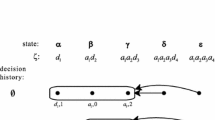Abstract
Two justifications of backward induction (BI) in generic perfect information games are formulated using Bonanno's (1992; Theory and Decision 33, 153) belief systems. The first justification concerns the BI strategy profile and is based on selecting a set of rational belief systems from which players have to choose their belief functions. The second justification concerns the BI path of play and is based on a sequential deletion of nodes that are inconsistent with the choice of rational belief functions.
Similar content being viewed by others
REFERENCES
Aumann, R. (1995), Backward induction and common knowledge of rationality, Games and Economic Behavior 8, 6–19.
Aumann, R. (1996), Reply to Binmore, Games and Economic Behavior 17, 138–146.
Balkenborg, D. and Winter, E. (1997), A necessary and sufficient epistemic condition for playing backward induction, Journal of Mathematical Economics 27, 325–345.
Basu, K. (1988), Strategic irrationality in extensive games, Mathematical Social Sciences 15, 247–260.
Basu, K. (1990), On the non-existence of a rationality definition for extensive games, International Journal of Game Theory 19, 33–44.
Battigalli, P. and Bonanno, G. (1999), Synchronic information, knowledge and common knowledge in extensive games, Research in Economics 53, 77–99.
Ben-Porath, E. (1997), Rationality, Nash equilibrium and backwards induction in perfect-information games, Review of Economic Studies 64, 23–46.
Bernheim, D. (1984), Rationalizable strategic behavior, Econometrica 52, 1007–1028.
Bicchieri, C. (1989), Self-refuting theories of strategic interaction: A paradox of common knowledge, Erkenntnis 30, 69–85.
Bicchieri, C. and Antonelli, G. A. (1995), Game-theoretic axioms for local rationality and bounded knowledge, Journal of Logic, Language, and Information 4, 145–167.
Binmore, K. (1987), Modelling rational players, I, Economics and Philosophy 3, 179–214.
Binmore, K. (1996), A note on backward induction, Games and Economic Behavior 17, 135–137.
Bonanno, G. (1991), The logic of rational play in games of perfect information, Economics and Philosophy 7, 37–65.
Bonanno, G. (1992), Rational beliefs in extensive games, Theory and Decision 33, 153–176.
Bonanno, G. (2001), Branching time, perfect information games and backward induction, Games and Economic Behavior 36, 57–73.
Dufwenberg, M. and Lindén, J. (1996), Inconsistencies in extensive games: Common knowledge is not the issue, Erkenntnis 45, 103–114.
Pearce, D. G. (1984), Rationalizable strategic behavior and the problem of perfection, Econometrica 52, 1029–1050.
Reny, P. J. (1993), Common belief and the theory of games with perfect information, Journal of Economic Theory 59, 257–274.
Rosenthal, R. (1981), Games of perfect information, predatory pricing and the chain-store paradox, Journal of Economic Theory 25, 92–100.
Samet, D. (1996), Hypothetical knowledge and games with perfect information, Games and Economic Behavior 17, 230–251.
Schuhmacher, F. (1999), Proper rationalizability and backward induction, International Journal of Game Theory 28, 599–615.
Selten, R. (1978), The chain store paradox, Theory and Decision 9, 127–159.
Stalnaker, R. (1998), Belief revision in games: Forward and backward induction, Mathematical Social Sciences 36, 31–56.
Vilks, A. (1994), On Bonanno's logic of rational play, Economics and Philosophy 10, 107–113.
Author information
Authors and Affiliations
Rights and permissions
About this article
Cite this article
Quesada, A. Belief system foundations of backward induction. Theory and Decision 53, 393–403 (2002). https://doi.org/10.1023/A:1024102216631
Issue Date:
DOI: https://doi.org/10.1023/A:1024102216631




